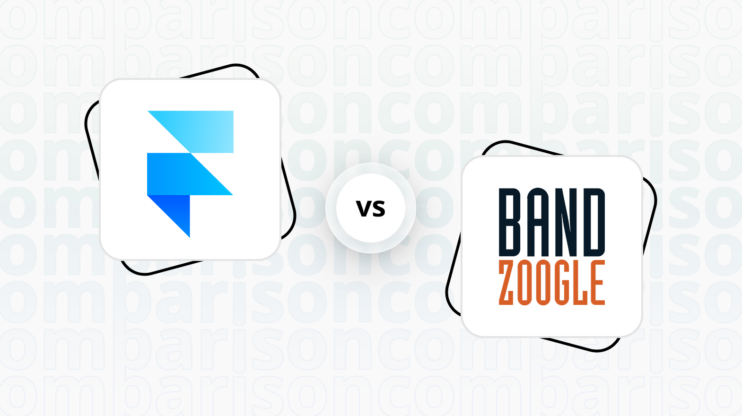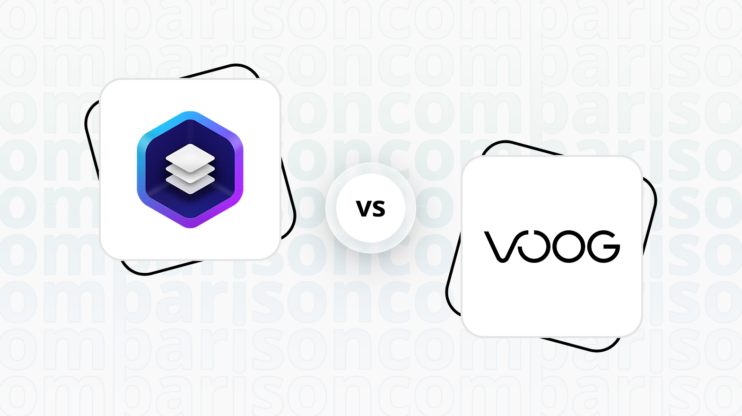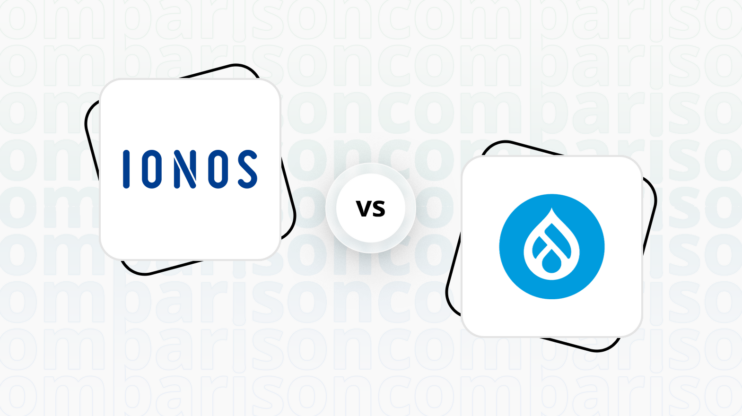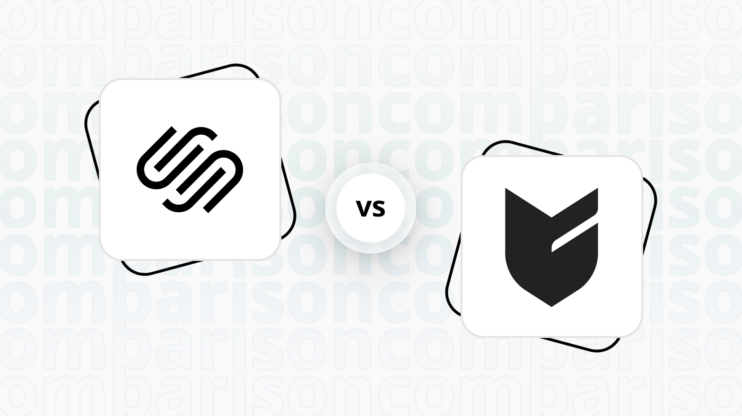Final verdict
Drupal and Instapage both offer unique strengths, catering to different user needs and preferences.
-
Drupal (Overall Grade: 6.4/10)
is a powerful open-source CMS known for its flexibility and extensibility. It is ideal for developers looking to create complex websites with custom functionalities. Drupal excels in providing a wide range of modules and themes, making it suitable for various types of websites, from personal blogs to corporate and government sites. However, its steep learning curve and less intuitive interface may pose challenges for beginners. -
Instapage (Overall Grade: 6.6/10)
is a comprehensive landing page platform designed to improve advertising conversion through personalization, optimization, and testing. It offers a user-friendly interface, making it accessible to users with varying levels of technical expertise. Instapage is particularly strong in creating high-performing landing pages without the need for a developer, making it an excellent choice for marketing teams and small businesses focused on lead generation and sales.

|

|
|
|---|---|---|
|
Design functionalities & templates |
7.8 |
8.0 |
|
Ease of use |
5.4 |
8.5 |
|
Ecommerce |
7.5 |
4.2 |
|
Website Editors |
7.5 |
7.5 |
|
Product testing options |
7.1 |
6.1 |
|
Price |
5.7 |
7.0 |
|
Hosting quality |
0 |
6.0 |
|
Website speed optimization |
6.4 |
6.2 |
|
Plugins and integrations |
8.6 |
6.8 |
|
Marketing features |
8.0 |
7.7 |
|
Customer support |
6.7 |
7.6 |
|
Security |
8.3 |
8.4 |
|
AI capabilities |
7.5 |
6.0 |
|
User Management |
9.1 |
7.3 |
Best for ecommerce
 7.5
7.5
 4.2
4.2
Verdict
: Drupal is the better choice for ecommerce due to its extensive features and flexibility, while Instapage is limited in this area.
-
Drupal
: Known for its robust ecommerce capabilities, Drupal offers a comprehensive solution with its Drupal Commerce module. It includes features like product management, shopping cart, payment gateway integration, and customizable workflows. However, it has a steep learning curve and may require extensive customization to meet specific ecommerce needs. When comparing Drupal vs Instapage, Drupal stands out for its flexibility and extensibility, making it suitable for complex ecommerce websites. -
Instapage
: Primarily a landing page platform, Instapage supports integration with ecommerce platforms like Shopify but does not offer ecommerce-specific templates or product page customization capabilities. It is recognized for its ease of use and focus on creating high-converting landing pages, but it falls short in providing comprehensive ecommerce functionalities. For those looking to build a full-fledged ecommerce site, Instapage may not be the ideal choice.
Best for informational & business websites
 7.5
7.5
 7.9
7.9
Verdict
: When it comes to creating informational and business websites, Instapage slightly outperforms Drupal with a score of 7.9 compared to Drupal’s 7.5. Instapage’s user-friendly interface and focus on landing page optimization make it a strong contender for businesses looking to enhance their online presence with minimal effort.
-
Drupal
: Drupal is a powerful open-source CMS known for its flexibility and extensibility, making it suitable for a wide range of websites, from personal blogs to corporate sites. However, its steep learning curve and complex interface can be challenging for beginners. Drupal’s extensive range of modules and themes allows for significant customization, but it may require more technical expertise to fully leverage its capabilities. -
Instapage
: Instapage excels in creating high-performing landing pages with its intuitive drag-and-drop builder and AI content generation. It is designed to improve advertising conversion through personalization and optimization, making it ideal for businesses focused on marketing and lead generation. Instapage’s ease of use and comprehensive support system make it accessible to users with varying levels of technical expertise, providing a seamless experience for creating and managing landing pages.
Detailed comparison
Design functionalities & templates
Design FunctionalitiesRepresents how well each platform allows for creative design and customization of websites.Score Components:
- Template Variety (30%): Range and quality of design templates.
- Customization (30%): Flexibility and options for design alterations.
- User Interface (20%): Ease and intuitiveness of the design process.
- Responsiveness (10%): Adaptability to different devices and screen sizes.
- Innovation (10%): Unique design features and tools.
 7.8
7.8
 8.0
8.0
🏆
Winner: Instapage.
While Drupal offers a vast array of templates and designs, Instapage edges out with its focus on conversion-optimized landing pages and ease of use.
Drupal, as a highly flexible and powerful content management system, offers a vast array of templates and designs to cater to virtually any website need. With thousands of themes available, users can choose from minimalist designs, industry-specific layouts, and highly customizable multipurpose themes.
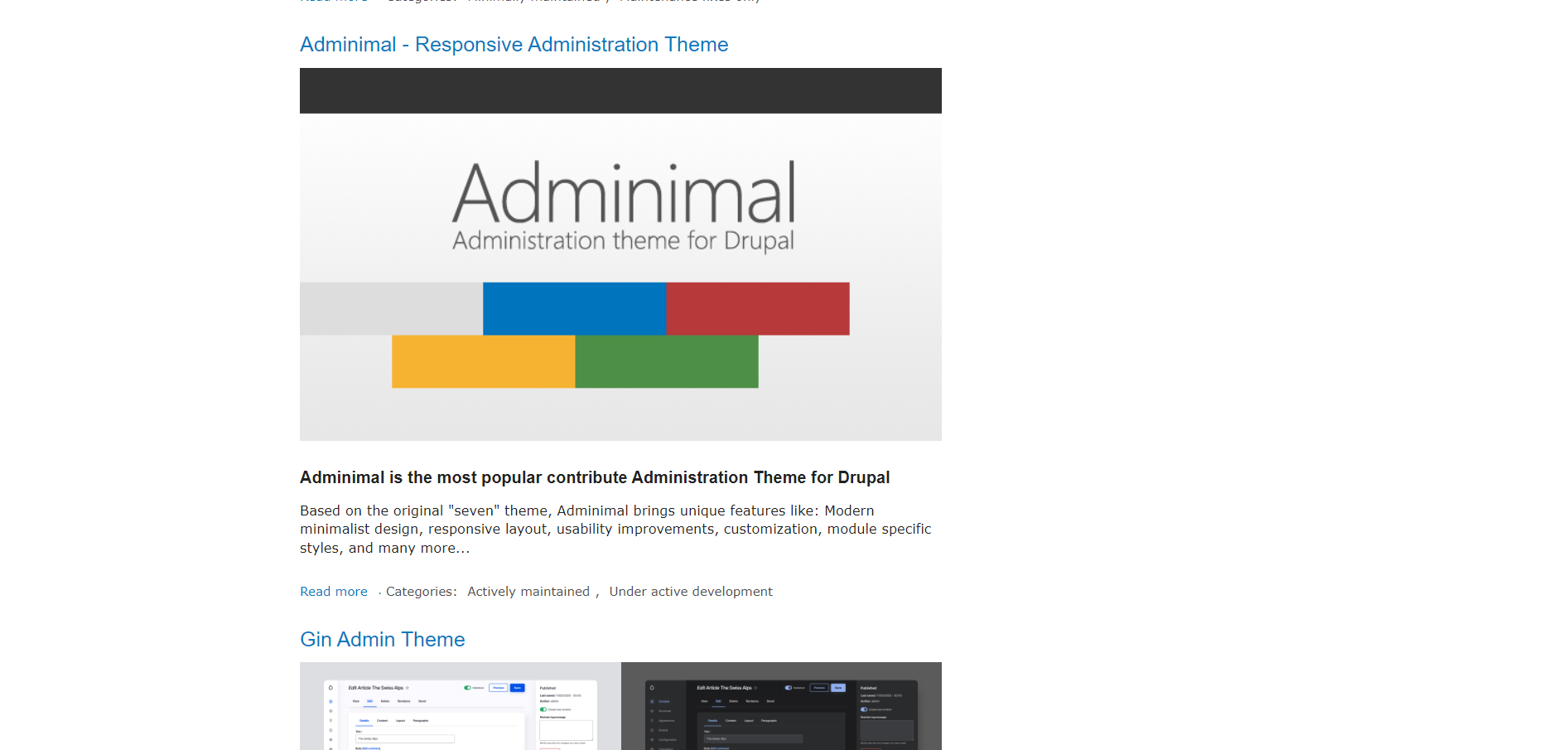
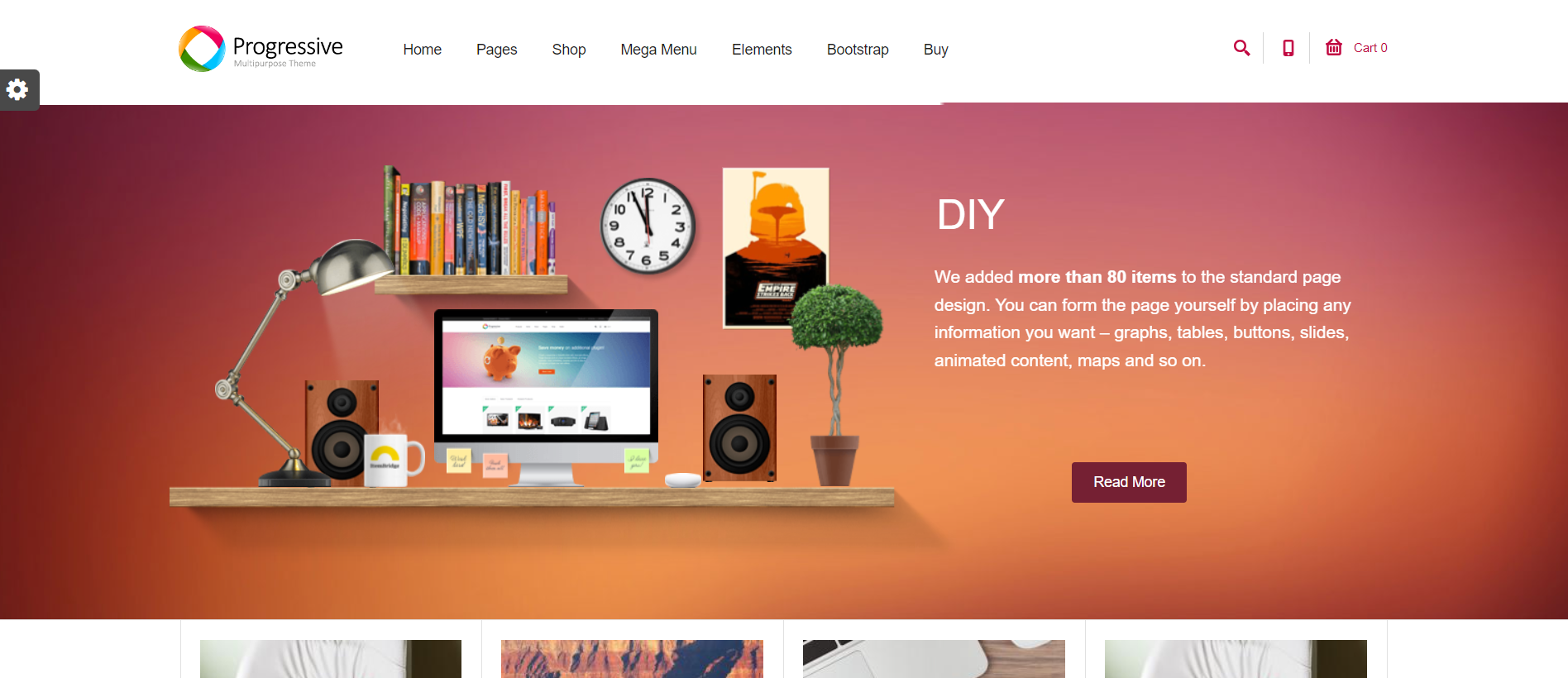
On the other hand, Instapage provides an extensive collection of 100+ design templates for website building, business-specific templates. These templates are tailored to support small teams and businesses in executing their marketing campaigns efficiently, including features for marketing automation, CRM, and analytics integrations.
Get a head start on website creation with AI
Create a custom website tailored to your business needs 10X faster with 10Web AI Website Builder!
Ease of use
Ease of useReflects the platform’s overall user-friendliness.Score
Components:
- Learning curve (40%): Quickness and ease of getting started.
- Interface design (30%): Simplicity and intuitiveness of layout.
- User guidance (20%): Quality of tutorials and support.
- Flexibility (10%): Adaptability to various user skills.
 5.4
5.4
 8.5
8.5
🏆 Winner: Instapage
. Scoring an impressive 8.5, Instapage is recognized for its user-friendly interface and intuitive drag-and-drop builder, making it accessible to users with various levels of technical expertise. On the other hand, Drupal, with a score of 5.4, offers a powerful platform for building complex websites and applications, but its steep learning curve and less intuitive interface make it less suitable for beginners.
Learning Resources
🏆 Winner: Drupal
. Both platforms offer extensive learning resources, but Drupal’s resources are more comprehensive and beneficial for advanced users looking to deepen their expertise. Instapage also offers a wide range of learning resources, but they are more focused on education and support.
For ecommerce
EcommerceMeasures the platform’s effectiveness in supporting online business activities.Score Components:
- Ecommerce themes and templates (20%): Variety and design of templates.
- Product management (25%): Ease of managing and organizing products.
- Payment options (25%): Variety and convenience of payment methods.
- Ecommerce features (20%): Features for managing an ecommerce store.
- Integration (10%): Compatibility with external e-commerce tools and services.
 7.5
7.5
 4.2
4.2
When it comes to ecommerce, Drupal and Instapage offer different capabilities. Drupal, with its Drupal Commerce module, provides a comprehensive ecommerce solution that includes features like product management, shopping cart, payment gateway integration, and customizable workflows. However, it has a steep learning curve and may require extensive customization to meet specific ecommerce needs. On the other hand, Instapage, primarily a landing page platform, supports integration with ecommerce platforms like Shopify but does not offer ecommerce specific templates or product page customization capabilities.

|

|
|
|---|---|---|
|
Ecommerce themes and templates |
7.8 |
0.0 |
|
Product page customization |
8.3 |
0.0 |
|
Payment processing and commissions |
7.5 |
5.0 |
|
POS capabilities |
5.5 |
0.0 |
|
Payment gateways |
7.7 |
6.0 |
|
Product numbers |
7.0 |
0.0 |
|
Additional ecommerce features |
8.0 |
4.0 |
Drupal ecommerce features:
- Shopping Cart and Checkout Process
- Payment Gateway Integration
- Order Management and Invoicing
- Tax Calculation and VAT Support
- Shipping and Fulfillment
- Promotions and Discounts
- Reporting and Analytics
- Security and Compliance
Instapage ecommerce features:
- Shopify integration
- Payment gateways such as Stripe and Paypal
Ecommerce themes & templates
Drupal offers a wide array of ecommerce themes designed to cater to different types of online stores. These themes are built with responsiveness in mind, ensuring that stores function seamlessly across various devices. Themes like Fiora, DrupalMag, and Storefront highlight the diversity available, offering customization options to match the unique needs of each business. In contrast, Instapage does not have ecommerce specific templates.
Product page customization
Drupal offers extensive customization possibilities for product pages through its modular architecture, allowing for detailed content types, flexible displays with Views, and theme customizations. The Drupal Commerce module enriches ecommerce functionalities, enabling tailored product management, checkout flows, and payment systems. With the ability to develop custom modules, Drupal provides a range of possibilities to meet specific ecommerce needs. Instapage, however, does not have product page customization capabilities.
Payment processing
Drupal supports a wide range of payment gateways through third-party modules, including popular ones like PayPal, Stripe, and Authorize.Net. These modules enable seamless integration for ecommerce functionalities on Drupal sites. While Drupal itself does not charge any commissions or transaction fees, the individual payment gateways integrated with it do have their own fee structures, which typically include per-transaction charges and may also have monthly fees. The specific fees depend on the chosen payment gateway and the terms of service agreed upon by the website owner. Instapage supports payment gateway integration, notably through external systems and third-party services like Commence Payments for Stripe, facilitating various payment options such as Apple Pay, Google Pay, and card payments. The platform itself does not directly charge commissions for transactions, but payment gateways may have their own fees. While Instapage specializes in creating high-converting landing pages with a focus on online marketing, it does not explicitly offer Point of Sale (POS) capabilities, suggesting a primary use case away from direct sales or retail transactions.
Website Editors
Website EditorsEvaluates the platforms’ website building and editing capabilities.Score Components:
- Customization tools (40%): Range and power of editing features.
- Editor usability (30%): User experience within the editor.
- Design flexibility (20%): Freedom in layout and design changes.
- Update and maintenance ease (10%): Simplicity of updating and maintaining the site.
 7.5
7.5
 7.5
7.5
Winner: Tie
. Both Drupal and Instapage scored 7.5 for their website editors, each offering unique features catering to different user needs.
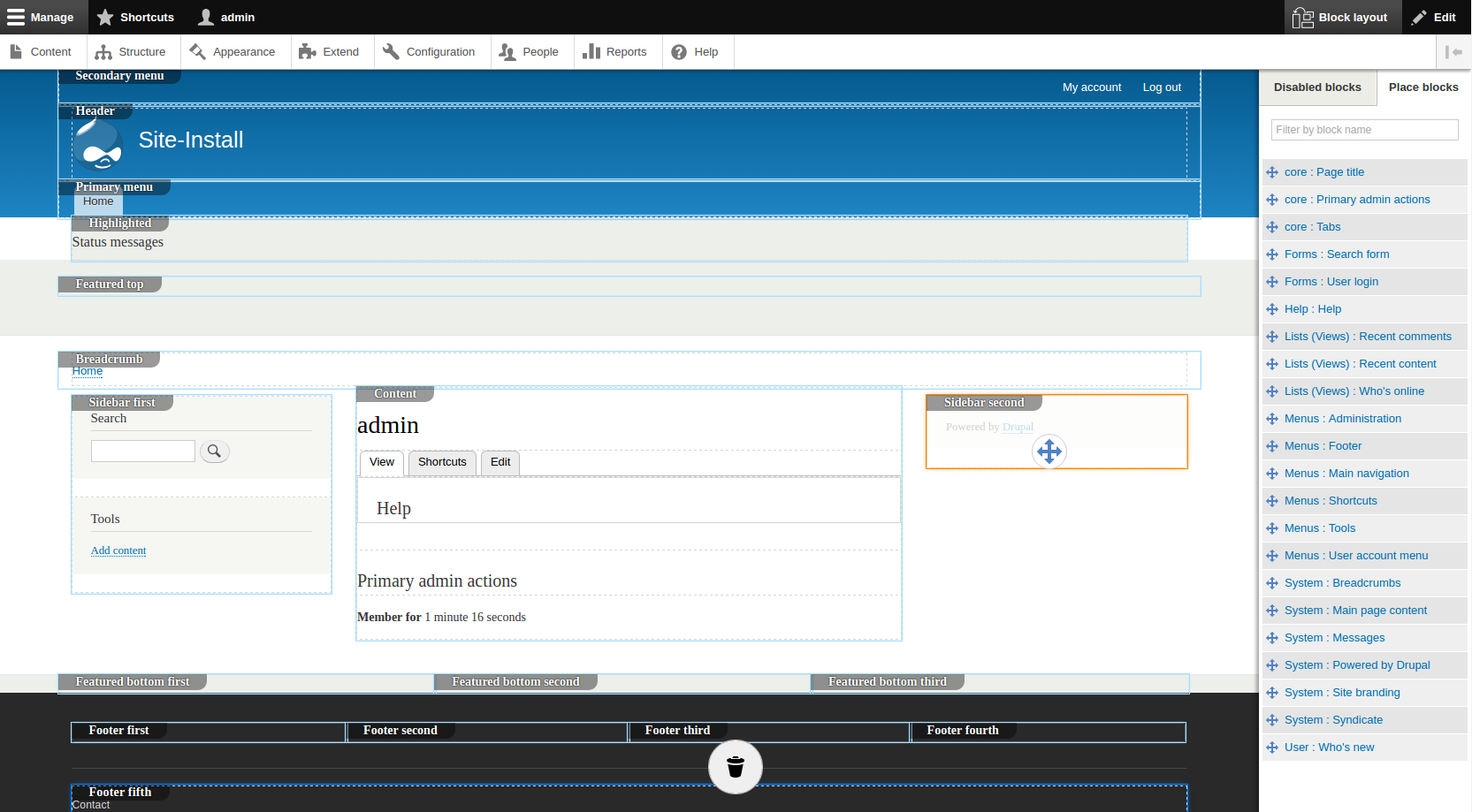
Drupal’s editor, commonly integrated through modules such as CKEditor, offers a wide range of features tailored for content creation and management. It supports rich text editing, enabling users to format text, insert links, images, and media, as well as create tables and lists with ease. The editor is highly customizable, allowing administrators to configure toolbars and options according to the needs of their site. Furthermore, it integrates seamlessly with Drupal’s content management system, supporting features like automatic content saving, version control, and access control, making it a powerful tool for building and managing diverse web content.
Instapage is a comprehensive website builder focused on creating and optimizing landing pages for various marketing campaigns. It offers a drag-and-drop editor, AI content generation, detailed analytics, and extensive customization through custom code editing, alongside security and compliance features. The platform supports collaboration, integrates with numerous marketing tools, and is designed to streamline the process of building, testing, and optimizing landing pages to increase conversions.
Mobile editor/app
 0
0
 0
0
🏆
Winner: None
. Unfortunately, neither Drupal nor Instapage offers a dedicated mobile editor app. This means that users cannot edit their websites or landing pages directly from a mobile device using a dedicated app. This could be a significant drawback for users who prefer to make quick edits or updates on the go. Therefore, if mobile editing is a crucial feature for you, you might want to consider other website builders that offer this functionality.
Product testing options
Product Testing OptionsAssesses the options for trying out platform features before commitment.Score Components:
- Trial quality (40%): Extent and usefulness of the trial or free version.
- Feature accessibility (30%): How many features are available to test.
- Trial duration (20%): Length of the trial period.
- Ease of transition (10%): Smoothness of moving from trial to paid plans.
 7.1
7.1
 6.1
6.1
Overall Result
:
Drupal scores higher with a 7.1 compared to Instapage’s 6.1
. Drupal, being an open-source CMS, offers a free version for users to test and explore its functionalities. However, it does not provide a trial version or the possibility to test premium features. On the other hand, Instapage offers a 14-day free trial where users can test premium features, but it does not have a free version. Instapage also provides a 24-hour money-back guarantee.

|

|
|
|---|---|---|
|
Free Plan |
Yes (open-source software) |
No |
|
Trial Duration |
No |
14 days |
|
Testing Premium Features |
No |
During the free trial |
|
Money Back Guarantee |
No payments required |
24 hours |
Price
PriceLooks at the cost-effectiveness and value for money of each platform.Score Components:
- Plan value (40%): What each pricing tier offers.
- Transparency and clarity (30%): Clearness of pricing structures.
- Flexibility of plans (20%): Range of options to suit different budgets.
- Hidden costs (10%): Additional expenses not included in the plan.
 5.7
5.7
 7.0
7.0
Drupal is a free open-source CMS, but requires separate purchases for domain, web hosting, and website builder subscriptions. Instapage, on the other hand, offers a paid plan starting at $299 per month and a customized Convert plan for businesses seeking advanced features.

|

|
|
|---|---|---|
|
$0+ |
No offering at this amount. |
BUILD ($299/month): Optimize conversions with experimentation and lead generation. Includes #1 Landing page builder, No Conversion Limits, Server-Side A/B Testing, AI Content, Unlimited Triggered Popups, Thor Render Engine, Dynamic Text Replacement, SSL Encryption, GDPR Compliance, Google SSO, Zapier, HubSpot, Salesforce, Marketo Integration, Multi-Step Forms, Invisible reCAPTCHA, and more. Value for Price: 7.5 |
location. As a result in rare cases the prices displayed here can differ from the ones you see on their
websites.
Hosting quality
Hosting
qualityExamines the reliability and performance of the hosting solutions.Score Components:
- Uptime (40%): Consistency and reliability of website availability.
- Speed (30%): Loading times and performance.
- Bandwidth and storage (20%): Sufficiency of resources provided.
- Data centers (10%): Quality and distribution of hosting infrastructure.
 0
0
 6.0
6.0
🏆
Winner: Instapage
Instapage offers cloud hosting with a 99.9% uptime guarantee, while Drupal, being an open-source CMS, does not directly provide hosting services. The uptime, uptime guarantee, and data centers for Drupal depend on the hosting provider chosen by the user. This direct provision of hosting services and uptime guarantee gives Instapage a higher rating in hosting quality.

|

|
|
|---|---|---|
|
Do they offer hosting? |
No |
Yes |
|
Data Centers: |
Depends on hosting provider | Not disclosed |
|
Type of hosting: |
Depends on hosting provider | Cloud Hosting |
|
Uptime: |
Depends on hosting provider | 99.9% |
|
Uptime Guarantee: |
Depends on hosting provider | Yes, 99.9% |
Website Speed Optimization
Website Speed OptimizationEvaluates optimization of website loading timesScore Components:
- PageSpeed Score (30%): Google’s score indicating performance optimization.
- Loading Time (30%): The average time until a website is fully interactive.
- Mobile Optimization (15%): Optimization effectiveness for mobile devices.
- Resource Optimization (15%): Optimizing images, scripts, and other heavy resources.
- CDN Usage (10%): Use of CDN to enhance speed across geolocations.
 6.4
6.4
 6.2
6.2
🏆 Winner: Drupal
Both Drupal and Instapage offer various strategies for speed optimization, but Drupal’s flexibility and extensibility give it a slight edge over Instapage.

|

|
|
|---|---|---|
|
Focus |
Flexibility and extensibility |
Personalization, optimization, and testing |
|
Performance Tools |
Various modules and themes |
AI content generation, targeted messaging |
|
Key Strategies |
Users can optimize almost all aspects of their website |
Responsive design, Image optimization, Caching |
|
Load Times |
Varies depending on optimization and website complexity |
Varies depending on optimization |
|
Page Speed Scores Range |
Varies depending on optimization and website complexity |
Varies depending on optimization |
|
Core Web Vitals Improvement |
Depends on users |
No information provided |
Drupal, an open-source content management system (CMS), is known for its flexibility and extensibility, enabling developers to create complex websites with custom functionalities. It provides a wide range of modules and themes that can be used to customize the appearance and behavior of a website. Drupal offers numerous guides and tutorials on speed optimization, allowing users to optimize almost all aspects of their website. However, load times and PageSpeed scores vary depending on the level of optimization and website complexity. Improvements in Core Web Vitals also depend on the users.
On the other hand, Instapage is a comprehensive landing page platform designed to improve advertising conversion through personalization, optimization, and testing. It offers a range of tools for creating, testing, and optimizing landing pages. The platform’s strategies for speed optimization include responsive design, image optimization, and caching. However, like Drupal, load times and PageSpeed scores vary depending on the level of optimization. Instapage does not provide any information on their Core Web Vitals improvements.
Get a head start on website creation with AI
Create a custom website tailored to your business needs 10X faster with 10Web AI Website Builder!
Plugins and integrations
Plugins and integrationsMeasures the range and effectiveness of additional plugins and integrations.Score Components:
- Variety of options (40%): Range of available add-ons.
- Integration smoothness (30%): Ease of integrating plugins into the site.
- Quality of plugins (20%): Functionality and reliability of the options.
- Custom integration capabilities (10%): Support for custom or third-party integrations.
 8.6
8.6
 6.8
6.8
🏆 Winner: Drupal.
With a score of 8.6, Drupal outperforms Instapage, which scores 6.8. Drupal’s extensive range of over 51,000 modules, compared to Instapage’s 40 integrations, gives it a significant edge. These modules extend Drupal’s capabilities beyond its core features, enabling functionalities like advanced SEO tools, e-commerce solutions, and custom content types. On the other hand, Instapage’s integrations enable advanced analytics, sophisticated A/B testing, and direct email marketing automation, among other enhancements. However, the sheer volume and versatility of Drupal’s modules make it the clear winner in this category.
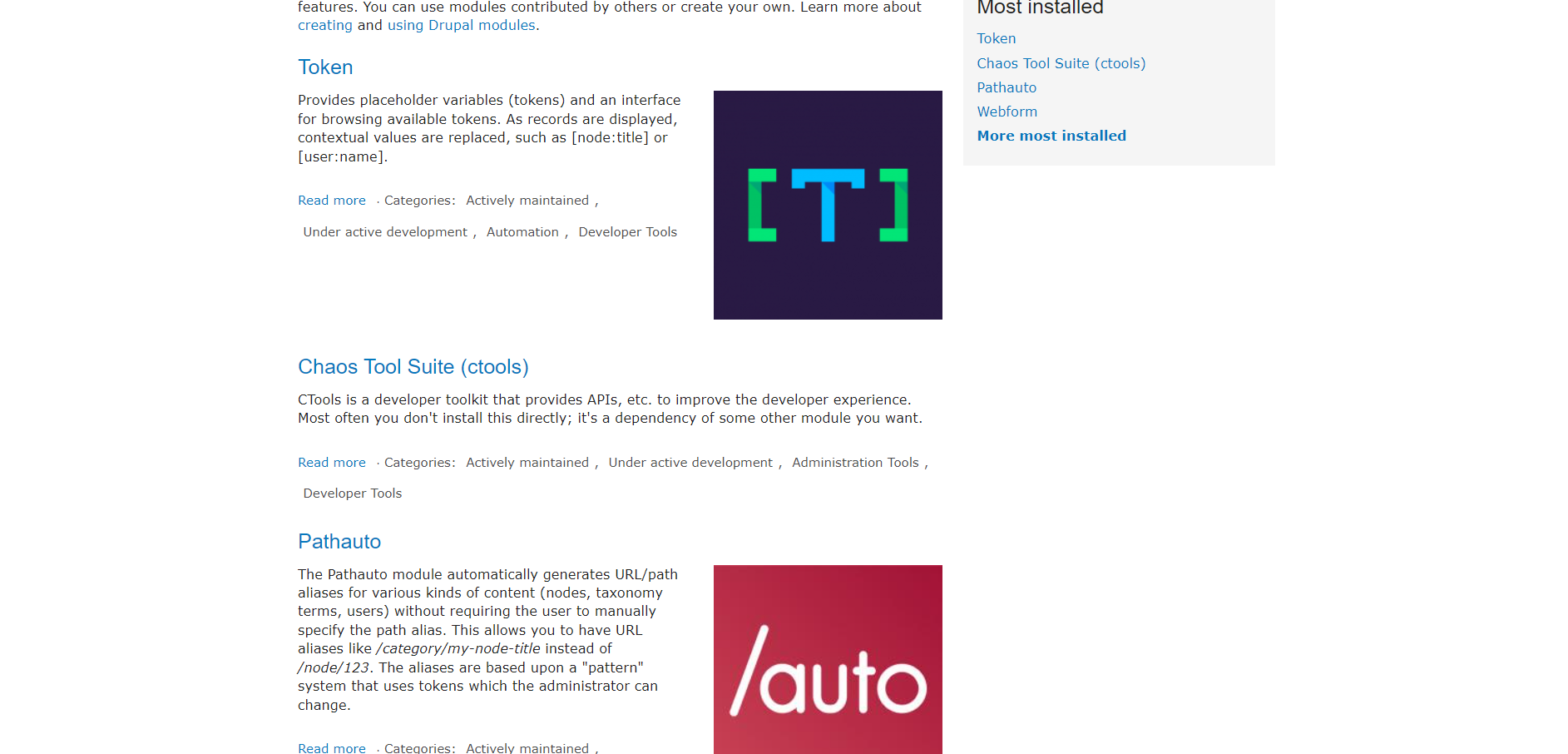
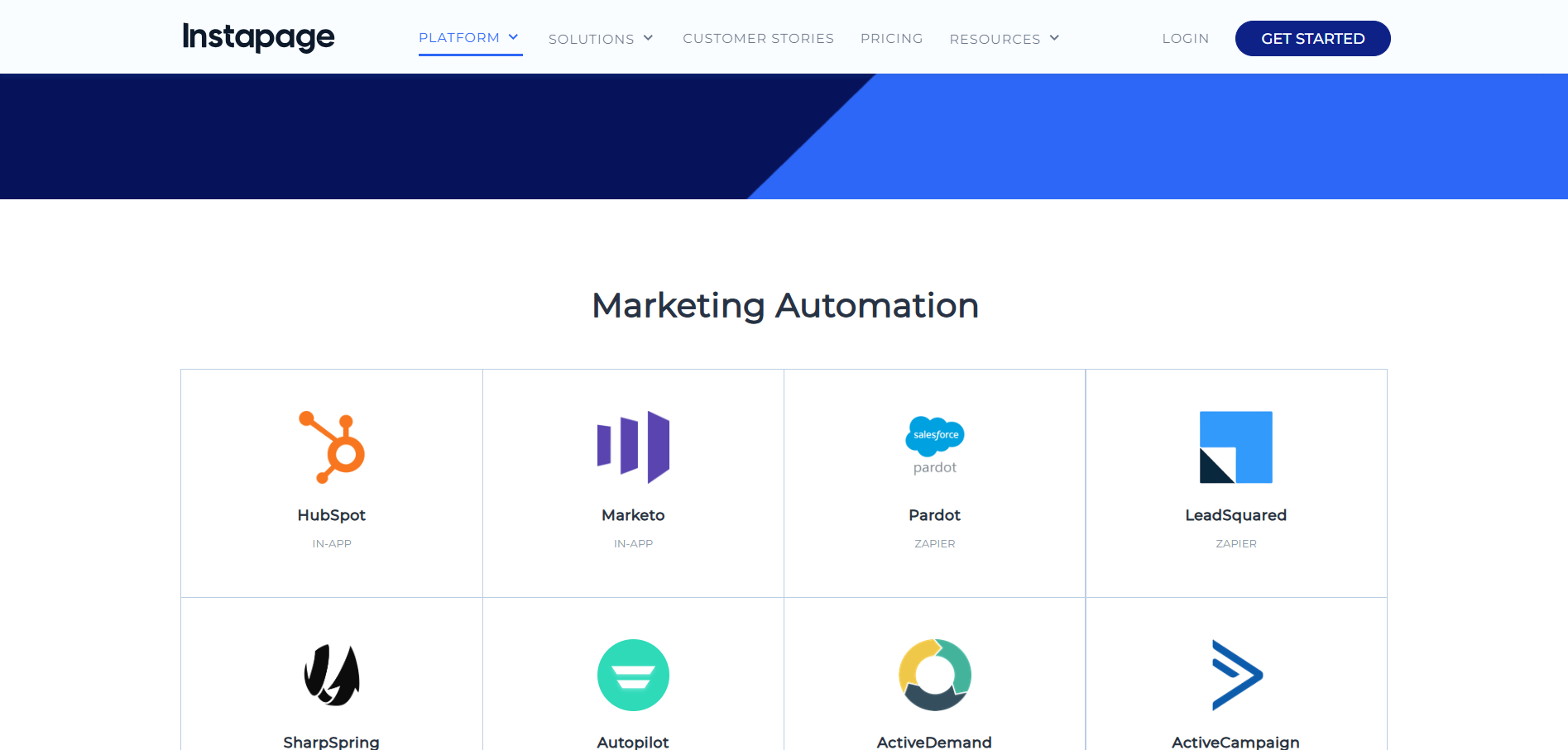
Marketing Features
Design FunctionalitiesRepresents how well each platform allows for creative design and customization of websites.Score Components:
- Template Variety (30%): Range and quality of design templates.
- Customization (30%): Flexibility and options for design alterations.
- User Interface (20%): Ease and intuitiveness of the design process.
- Responsiveness (10%): Adaptability to different devices and screen sizes.
- Innovation (10%): Unique design features and tools.
 8.0
8.0
 7.7
7.7
🏆
Overall Winner: Drupal
. Drupal stands out for its flexibility and extensibility, enabling developers to create complex websites with custom functionalities. Instapage, on the other hand, is recognized for its ease of use, allowing for the creation of high-performing landing pages without the need for a developer.

|

|
|
|---|---|---|
|
SEO Tools |
Yes, with SEO modules such as Yoast SEO |
Yes |
|
Email Marketing |
Yes, but with third-party extensions, such as MailChimp |
Yes |
|
Blogging |
Yes |
No |
|
Social Media Integration |
Yes |
Yes |
|
Analytics and Reporting |
Yes, basic built-in features, and Google Analytics integrations through modules |
Yes, including conversion analytics, real-time reports, and A/B testing |
|
Ads and Promotions |
Yes, but with third-party extensions |
Yes, with features like AdMap for ad-to-page personalization and integration with advertising platforms |
Customer Support
Customer supportEvaluates the quality and availability of support options.Score Components:
- Response time (40%): Speed of support responses.
- Support quality (30%): Effectiveness and helpfulness of the support.
- Availability (20%): Range of support channels (phone, chat, email).
- Resource richness (10%): Quality of self-help and educational materials.
 6.7
6.7
 7.6
7.6
🏆 Winner: Instapage
. Comparing Drupal vs Instapage, Instapage takes the lead in customer support with its more accessible and structured support system. Instapage offers live chat support available 24 hours a day from Monday to Friday, along with email and phone support during business hours. This ensures users can get timely assistance for their landing page needs. Additionally, Instapage provides personalized support for enterprise users through Success Managers and Launch Specialists, enhancing the overall support experience.
Drupal, on the other hand, relies heavily on community support through forums and documentation available on Drupal.org. While professional 24/7 support is available via third-party providers like Drupal Connect, it may not be as seamless or integrated as Instapage’s support system. Drupal’s support is comprehensive but may require more effort from users to find the right resources and assistance.
Security
SecurityLooks at the platforms’ security measures and data protection.Score Components:
- Data protection (40%): Safeguards for user and customer data.
- SSL and encryption (30%): Implementation of secure connections.
- Compliance (20%): Adherence to industry security standards.
- Regular updates (10%): Frequency of security updates and patches.
 8.3
8.3
 8.4
8.4
🏆
Winner: Instapage
. Instapage edges out Drupal with a slightly higher security score. Instapage’s commitment to GDPR compliance, SOC 2 Type I and Type II compliance, risk management policies, and a robust Information Security Program based on ISO 27001/2 and NIST 800-53 frameworks demonstrate a comprehensive approach to security. SSL/HTTPS support for all landing pages ensures secure client data handling and privacy.
Drupal, while scoring slightly lower, also offers robust security features. It emphasizes website security through regular updates, built-in mechanisms for preventing common web vulnerabilities, and advanced security features like two-factor authentication. Drupal’s proactive security approach is bolstered by a dedicated security team that continuously works on identifying and fixing vulnerabilities. However, as an open-source CMS, the security of a Drupal site heavily depends on how well it is configured and maintained by the user or developer.
AI Capabilities
AI capabilitiesMeasures the effectiveness of AI-driven features and tools.Score Components:
- Automation efficiency (40%): Impact of AI on streamlining processes.
- Personalization (30%): AI-driven customization for users or customers.
- AI-Assisted design (20%): Role of AI in website design and functionality.
- Data analysis (10%): Use of AI in interpreting user data and analytics.
 7.5
7.5
 6.0
6.0

|

|
|
|---|---|---|
|
AI Builder |
Drupal does not have an AI website builder |
Instapage does not have an AI builder |
|
AI Ecommerce features |
Enhanced through chatbots, content creation, marketing automation, and cognitive services |
Instapage does not have AI ecommerce features |
|
AI content generation |
Enabled through modules like AI Connect, OpenAI and ChatGPT |
AI Content Generator facilitates quicker landing page creation |
|
Additional AI features |
AI-based search enhancements, content personalization, automated content moderation |
AI Experiments dynamically allocate traffic to landing pages |
🏆 Winner: Drupal
. Drupal, with a score of 7.5, utilizes AI to enhance various functionalities, including e-commerce, content creation, marketing automation, and cognitive services. It also integrates AI services for diverse functionalities like content generation, SEO optimization, and multilingual support.
Instapage, scoring 6.0, does not have AI ecommerce features but it does have an AI Content Generator designed to facilitate quicker landing page creation by automatically producing content tailored to the target audience. It also allows dynamic traffic allocation to landing pages through AI Experiments. However, compared to Drupal, its AI capabilities are limited.
User Management
User ManagementAssesses the platforms’ capabilities in managing user roles, permissions, and accessibility.Score Components:
- Role Customization (40%): Flexibility in creating and defining user roles and
permissions. - Ease of Management (30%): User interface and tools for managing users.
- Access Control (20%): Effectiveness of access control measures for different user
levels. - Scalability (10%): Ability to manage a growing number of users efficiently.
 9.1
9.1
 7.3
7.3
🏆 Winner: Drupal
. Drupal’s flexible permission and role system allows for an unlimited number of users to manage and edit a website, only constrained by server capacity and practical management considerations. Administrators can create various roles, such as “Editor” or “Administrator”, each with customized permissions. There’s no inherent limit in Drupal on the number of users with administrative or editing capabilities, enabling extensive collaboration and content management possibilities.
On the other hand, Instapage users managing a website can be assigned different roles: Viewer, Editor, or Manager. A Viewer has limited access, only able to view pages. An Editor can edit pages, and a Manager has full access except for billing information and the audit log. The number of users you can invite depends on your subscription limits. However, only one user can edit a page at a time to prevent overwrite issues.
Drupal User Roles and Access Levels:
| Role | Description | Access Highlights |
|---|---|---|
| Editor | Users responsible for content creation, editing, and publishing. | Can create, edit, delete, and publish content; can also manage comments. |
| Moderator | Users focused on site moderation, including comment and user management. | Can approve or delete comments, block users, and manage reported content. |
| Administrator | Users with full access to all administrative features of the site. | Can change site configuration, manage all content, users, permissions, and install modules/themes. |
Instapage User Roles and Access Levels:
| Role | Description | Access Highlights |
|---|---|---|
| Administrator | Oversees the entire Instapage account, managing users, settings, and billing information. | Full access to all features, including user management, settings, billing, and page creation and editing. |
| Editor | Works on creating and editing landing pages, responsible for the design and content. | Can create and edit pages, manage integrations, and view analytics, but cannot change account settings or manage users. |
| Viewer | Has view-only access to the landing pages, typically for review or analytics purposes. | Can view pages and analytics but cannot make any edits or access account settings. |
Additional Features

|

|
|
|---|---|---|
|
SSL Certificate |
|
|
|
Custom Domain |
|
|
|
Free Custom Domain Included |
|
|
|
International Domains |
|
|
|
Mobile Responsive |
|
|
|
Page Speed |
|
|
|
Website Builder Mobile App |
|
|
|
Convert a Website To An App |
|
|
|
Website Analytics |
|
|
|
Multilingual Sites |
|
|
|
Multiple Users |
|
|
User Feedback
Users appreciate Drupal for its ease of use, security, and flexibility as an open-source CMS, highlighting its ability to scale and support a variety of websites and applications with modern technology tools. The community and documentation are frequently mentioned positives, providing ample support and resources. However, criticisms include a relative lack of plugins and themes compared to competitors like WordPress, the learning curve for customization without coding, and some challenges with installation and updates. The platform is praised for its robust content management capabilities, enabling users to manage content and user access efficiently. Overall, feedback underscores Drupal’s strength in creating secure, customizable, and scalable web solutions, despite some desires for more intuitive UI and easier setup.
Users generally appreciate Instapage for its user-friendly interface, robust customer support, and seamless integration capabilities, highlighting its effectiveness in creating high-quality, high-converting landing pages optimized for lead capture. Positive feedback emphasizes the platform’s ease of use, allowing both experienced marketers and newcomers to quickly design and deploy landing pages, along with its broad range of integrations with other marketing tools and CRM systems. However, some users encounter challenges with mobile responsiveness, custom domain settings, and occasional bugs.
The making of this blog
We followed a clear, step-by-step process to write and research this article.
FAQ
Which platform is better for ecommerce, Drupal or Instapage?
Can I use Drupal and Instapage for creating informational business websites?
How do Drupal and Instapage compare in terms of design functionalities and templates?
Which platform is easier to use, Drupal or Instapage?
How do the website editors of Drupal and Instapage compare?
What are the product testing options available on Drupal and Instapage?
Which platform offers better hosting quality, Drupal or Instapage?
In terms of website speed optimization, which platform is better?
How do Drupal and Instapage compare in plugins and integrations?
Which platform has better marketing features?
How does customer support compare between Drupal and Instapage?
Which platform is more secure, Drupal or Instapage?










